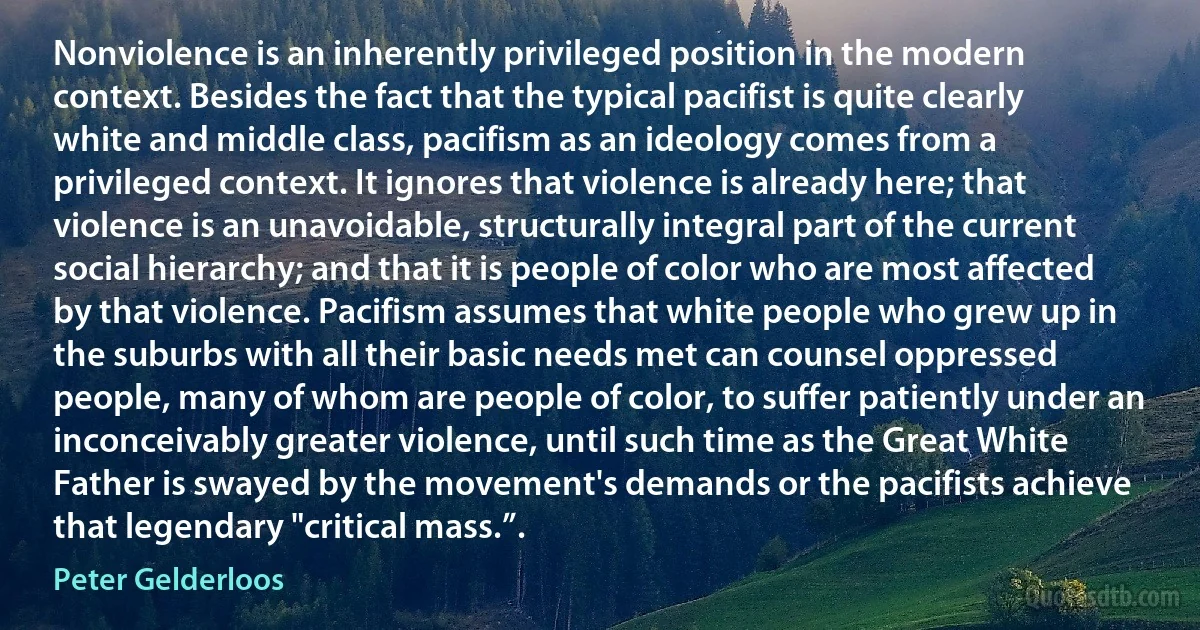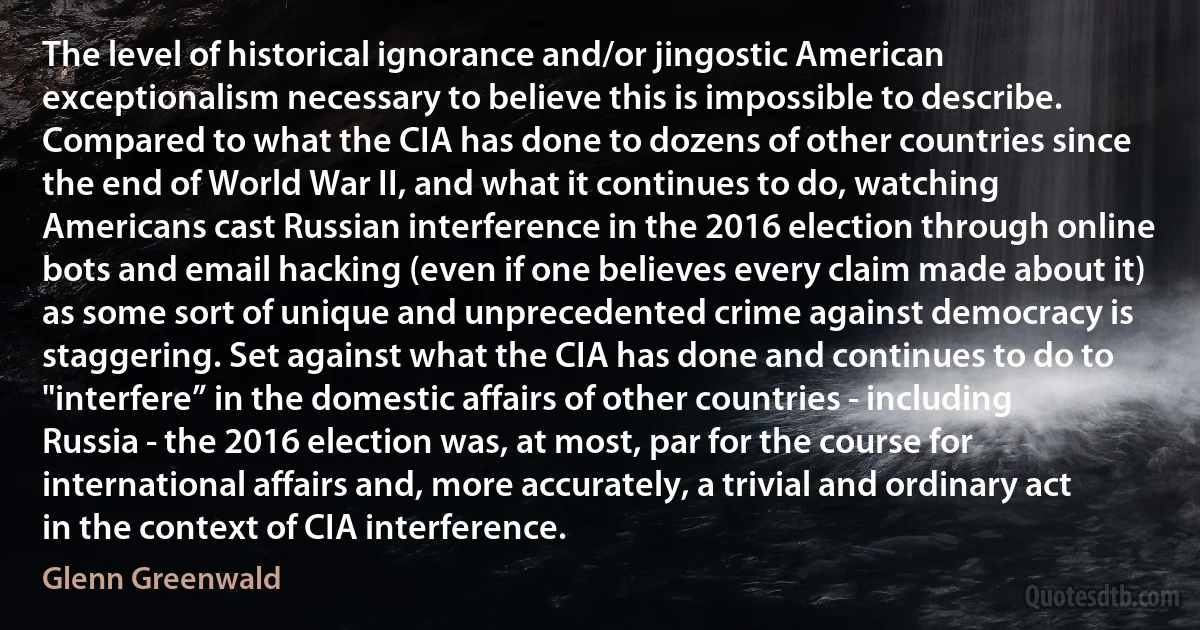Context Quotes - page 26
Yet what's missing from Cullen's explanation is a context for Harris' rage attack on Columbine High School. Even Hitler is given a context by serious historians- the humiliation of the Treaty of Versailles and the failure of Weimar Germany- whereas rampage murderers, like slaves once before them, are portrayed as having killed without reason. Their murder sprees were and are explained as symptoms of the perpetrators' innate evil, or of foreign forces, rather than as reactions to unbearable circumstances.

Mark Ames
[S]ince fear is ubiquitous, every civilization has devised ways to manage it. That has typically been accomplished in the context of religious culture. Dangers are easier to cope with for most people when they are seen as something other than completely random and meaningless, when they are integrated into shared narratives that make a certain kind of emotional sense. When traditional religious templates erode, as they have in most Western societies in recent times, the frameworks that control the psycho-social impact of fear erode with them. They have been replaced, in a manner of speaking, with the pseudo-religion of the therapeutic, whose obsession with absolute security has only served to make nearly everyone more anxious, not less.

Adam Garfinkle
And then she said and I have Rebecca, you know? Sort of the idea is I was delightful, and she said I was delightful, but in the context you could see I was a calamity nonetheless. I mean I think there was a real ambivalence about the role of children in lives of independent, thinking women. And what was transmitted to me was not that being a mom was the worst possible choice, but that it could definitely be a serious hindrance. And that there were other things worth pursuing more.

Rebecca Walker
Technology's rapid development and our ever-changing lifestyles created a fundamentally new and exhilarating backdrop for building, and in this new world context I felt we must reinvestigate the aborted and untested experiments of Modernism – not to resurrect them, but to unveil new fields of building.

Zaha Hadid
Camus dealt with the question best. He said that he liked individuals who take sides more than literatures that do. 'One either serves the whole of man or does not serve him at all. And if man needs bread and justice, and if what has to be done must be done to serve this need, he also needs pure beauty which is the bread of his heart.' So Camus called for 'Courage in and talent in one's work.' And Márquez redefined tender fiction thus: The best way a writer can serve a revolution is to write as well as he can.
I believe that these two statements might be the credo for all of us who write. They do not resolve the conflicts that have come, and will continue to come, to contemporary writers. But they state plainly an honest possibility of doing so, they turn the face of the writer squarely to her and his existence, the reason to be, as a writer, and the reason to be, as a responsible human, acting, like any other, within a social context.

Nadine Gordimer
U.S. prostitution can be understood in the context of the cultural normalization of prostitution as a glamorous and wealth-producing "job” for girls who lack emotional support, education, and employment opportunities. The sexual exploitation of children and women in prostitution is often indistinguishable from incest, intimate partner violence, and rape.

Melissa Farley
Part of me wonders if I should've labelled by characters according to contemporary definitions of gender and sexuality so there'd be no doubt in anyone's mind. To me, all of these labels are context dependent and therefore it does not feel authentic or organic to use words that have developed out of our contemporary discourse to describe my characters...

Rivers Solomon
Since it is always the same person whose mind thinks, wills, and judges, the autonomous nature of these activities has created great difficulties. Reason's inability to move the will, plus the fact that thinking can only "understand” what is past what neither remove it nor "rejuvenate it” ... have led to the various doctrines asserting the mind's impotence and the force of the irrational, in brief to Hume's famous dictum that "Reason is and ought only to be the slave of the passions,” that is, to a rather simple-minded reversal of the Platonic notion of reason's uncontested rulership in the household of the soul. What is so remarkable in all these theories and doctrines is their implicit monism, the claim that behind the obvious multiplicity of the world's appearances and, even more pertinently to our context, behind the obvious plurality of man's faculties and abilities, there must exist a oneness - the old hen pan, "the all is one” - either a single source or a single ruler.

Hannah Arendt
It is in this context that the freedom rhetoric must be understood. It is a way of speaking which resonates somewhat and seems to have resonated effectively in the last three years. But it is not what Conservatives want, even if it fits in with what they want. Indeed, it is a way of not saying what they want, a way of attracting sympathy and support for, and attributing principle to, a social structure which they wish to conserve or restore.

Maurice Cowling
The first great frontal assault on the Enlightenment was launched by Jean-Jacques Rousseau (1712-1778). Rousseau has a well-deserved reputation as the bad boy of eighteenth century French philosophy. In the context of Enlightenment intellectual culture, Rousseau's was a major dissenting voice. He was an admirer of all things Spartan-the Sparta of militaristic and feudal communalism-and a despiser of all things Athenian-the classical Athens of commerce, cosmopolitanism, and the high arts. Civilization is thoroughly corrupting, Rousseau argued -- not only the oppressive feudal system of eighteenth-century France with its decadent and parasitical aristocracy, but also its Enlightenment alternative with its exaltation of reason, property, the arts and sciences. Name a dominant feature of the Enlightenment, and Rousseau was against it.

Jean-Jacques Rousseau
We seem to live mainly in order to see how we live, and this habit brings on what might be called the externalizing of knowledge; with every new manual there is less need for its internal, visceral presence. The owner or user feels confident that he possesses its contents - there they are, in handy form on the handy shelf. And with their imminent transfer to a computer, that sense of possession will presumably attach itself to the hard disk or the phone number of the data bank.
To say this is also to say that the age of ready reference is one in which knowledge inevitably declines into information. The master of so much packaged stuff has less need to grasp context or meaning than his forbears: he can always look it up. His active memory is otherwise engaged anyway, full of the arbitrary names, initials, and code figures essential to carrying on daily life. He can be vague about the rest: he can always check it out.

Jacques Barzun
The time has come when badges of honour make our shame glaring in the incongruous context of humiliation, and I for my part, wish to stand, shorn, of all special distinctions, by the side of those of my countrymen who, for their so called insignificance, are liable to suffer degradation not fit for human beings.

Rabindranath Tagore
My nerdy teenage rebellion was to confront my parents with the scientific method, challenging their weird beliefs, asking for peer-reviewed data and scientific context. I remember that one day when I was 15, I asked my mother to use her divining rod and a piece of paper to determine the first 30 decimal values of pi. It took her three hours and not a single one was right. That felt like a huge success, but she just told me she had a bad day because of the full moon. Tomorrow she would try again and would succeed. And if not, who says that the 30 digits of pi in the math books are actually right? Maybe her version was correct in the first place and she had access to a higher knowledge? It simply wasn't possible to challenge her.

Johannes Grenzfurthner
I have been told that Dalrymple is a personable man, and in my own encounters with him I have indeed found him so, but what is of interest in this context is not Dalrymple the man, but Dalrymple the phenomenon. How did a White man, young, irreverent and likeable in his first and by far most readable India book, The City of Djinns, become the pompous arbiter of literary merit in India?

William Dalrymple (historian)
Now "cybernetics" is the term coined by Wiener to denote "steersmanship" or the science of control. Although current engineering usage restricts it to the study of flows in closed systems, it can be taken in a wider context, as the study of processes interrelating systems with inputs and outputs, and their structural-dynamic structure. It is in this wider sense that "cybernetics" will be used here, to wit, as system-cybernetics, understanding by "system" an ordered whole in relation to its relevant environment (hence one actually or potentially open).

Ervin László
The witch has been playing a semantic trick on us. We were already pretty salty animals when we came here! It is toy animals she has turned us into. We have been working against ourselves, trying to be men again, but to be her idea of men, since we live in her context. But she does not know real animals, or men. ... Be you not toys any longer! Stir up the wild business in you. You have to be real animals before you can be men.

R. A. Lafferty


